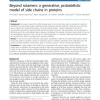Free Online Productivity Tools
i2Speak
i2Symbol
i2OCR
iTex2Img
iWeb2Print
iWeb2Shot
i2Type
iPdf2Split
iPdf2Merge
i2Bopomofo
i2Arabic
i2Style
i2Image
i2PDF
iLatex2Rtf
Sci2ools
BMCBI
2010
2010
Beyond rotamers: a generative, probabilistic model of side chains in proteins
Background: Accurately covering the conformational space of amino acid side chains is essential for important applications such as protein design, docking and high resolution structure prediction. Today, the most common way to capture this conformational space is through rotamer libraries - discrete collections of side chain conformations derived from experimentally determined protein structures. The discretization can be exploited to efficiently search the conformational space. However, discretizing this naturally continuous space comes at the cost of losing detailed information that is crucial for certain applications. For example, rigorously combining rotamers with physical force fields is associated with numerous problems. Results: In this work we present BASILISK: a generative, probabilistic model of the conformational space of side chains that makes it possible to sample in continuous space. In addition, sampling can be conditional upon the protein's detailed backbone confo...
| Added | 08 Dec 2010 |
| Updated | 08 Dec 2010 |
| Type | Journal |
| Year | 2010 |
| Where | BMCBI |
| Authors | Tim Harder, Wouter Boomsma, Martin Paluszewski, Jes Frellsen, Kristoffer E. Johansson, Thomas Hamelryck |
Comments (0)

